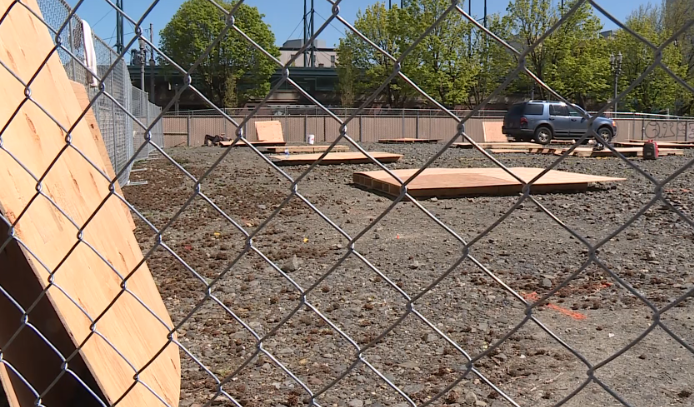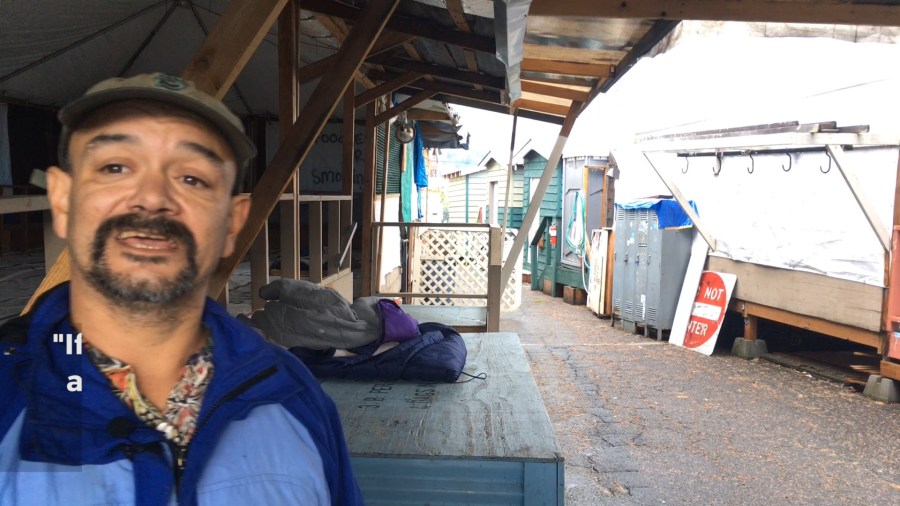PORTLAND, Ore. (KOIN) — Portland City Council is directing its bureaus to identify city-owned properties that can be used as viable outdoor shelter or transitional housing sites.
A city spokesperson told KOIN 6 News that property-owning bureaus were asked earlier this month for an inventory of sites for development by June 18, with finalized lists required by June 30.
The directive was part of the Shelter to Housing Continuum code package that was adopted by the city last month. Before then, there were no official city codes outlying sanctioned outdoor shelter standards. Instead, code exemptions from City Council were considered for outdoor camps on a case-by-case basis.
Heather Hafer, a spokesperson with the city’s Office of Management and Finance, told KOIN 6 News via email that even after the list of feasible sites are identified, it will take some time before any are deemed ready for development.

“Prior to opening the doors to potential villagers or guests, agreements must be in place with service providers to manage space in addition to ensuring basic amenities are set up and operationalized. At this point it is difficult to provide an accurate timeline beyond June 30, with so many details still being worked out,“ Hafer said.
It’s not the first time the city has relegated some of its properties for outdoor shelter sites during the pandemic.
Back in April 2020, immediately after the initial wave of the coronavirus pandemic ramped up in the U.S., Portland created three emergency outdoor shelters for people experiencing homelessness to allow them to safely shelter in place while also complying with public health guidance and physical distancing.
Two sites were located on the Central Eastside and one was in Old Town. They were designed to shelter a minimum of 135 people and prioritized underrepresented groups, such as LGBTQIA+ and Black, Indigenous and People of Color. Collectively, the sites were called Creating Conscious Communities with People Outside, or C3PO for short.
The Star Wars reference in the name was intentional, a nod to the previously created, independently run outdoor camp near the Moda Center, called Right 2 Dream Too, or R2DToo. That and Dignity Village, Hazelnut Grove, Kenton Women’s Village and St. John’s Village are all examples of ad-hoc outdoor shelters that have previously popped up in Portland. But the C3PO sites, and upcoming city-property locales to be determined, represent the first time a universal process or procedure has been established by the city for creating outdoor shelters.

City officials said they learned many principles of what it takes to create a successful outdoor camp that they will apply to future sites, such as having at least 30,000 sq ft to accommodate physical distancing and village common areas, building on flat surfaces that are preferably pavement or gravel, building in the shade and having access to utilities like water and electricity.
Still, managing the C3PO sites did come with challenges along the way. Although the project was endorsed by the Portland Business Alliance, a nearby business owner close to one of the sites irked at what he perceived as the lack of communication from the city when development began.
In addition, unsubstantiated rumors swirled online that the C3PO campsites were housing agitators affiliated with antifa, an umbrella term that is short for antifascist and refers to a range of far-left leaning militant groups that oppose neo-Nazis and white supremacists at protests. Those claims were assessed to be demonstrably false by the Associated Press and condemned as “cruel and dehumanizing” by local street newspaper and houseless advocacy nonprofit Street Roots, as the campsites were set up in April 2020, predating racial justice protests and unrest in the wake of the Minneapolis police murder of George Floyd more than a month later.
According to a blog post by the city, one of the challenges faced with managing the camps included two of the camps becoming a target for “extreme right-wing hate groups who threatened shelter residents.”
On Wednesday, the city announced that it would be increasing removals of unsanctioned urban camps that are considered high impact in terms of public health and safety. Officials said after the city initially halted then slowed-to-a-crawl camp removals, per Centers for Disease Control and Multnomah County Health guidance amid the pandemic, the number and sizes of camps increased this past year, as well as the amount of trash from camps around the city.
The hope from Mayor Ted Wheeler and other city commissioners is that identifying city-owned plots of outdoor camps, along with the more assertive protocols for removing unsanctioned ones, will allow officials “to act more quickly and safely as future camps establish and grow,” according to the joint statement.
Editor’s note: this story contains updated language in the last paragraph to better reflect what was written in the joint statement from the mayor and city commissioners.
